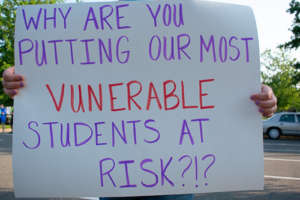Special Education and ESOL Teachers Rally to Protect Themselves and Their Students
Last month the Prince William County School Board announced that the school year will begin on September 8 with 100% virtual learning, at least for the first quarter. While that was cause for celebration, there is still a group of educators, parents and students who are still being left in the dark about how their school year will proceed.

On Wednesday at the Kelly Leadership Center in Manassas, a rally was held by the Prince William Education Association. The PWEA was in conjunction with county Special Education and English as a Second Language teachers to address concerns about the possibility of opening school with in-person instruction or using the hybrid model that was proposed earlier in the summer. Several educators came out wearing read in support of the teachers while the School Board held a closed session meeting.

We spoke with Ann Fletcher a teacher at Benita Fitzgerald School in Dale City. “I actually just came back to the county because I preferred PWC. Now I’m very disheartened by the way that SPED teachers and ESOL teachers have been treated. I mean it’s like we’re a test, let’s see what happens to this small group of people, and especially our students. We care about our students a lot and also our families, and I don’t think it’s fair for us to have to make a choice.”

Oveta Scott, one of the organizers of the rally, discussed the lack of transparency from the school board, particularly from outgoing Superintendent Dr. Steven Walts. “Dr. Walts is not being fully transparent with the school board. For him to say last week that we are going to work with this small control group, and if we make mistakes, we’ll learn from them. That’s hurtful. So, ask the parents now you want to make ESOL & SPED important? You want to bring the most vulnerable (students) in, when COVID is a predator that attacks the most vulnerable? That’s just wrong.”

“What is happening, they are not being honest about what the school day will look like. The teachers are being fitted for N95. Who can teach in an N95? The most vulnerable kids are the ones who need to see our face and our mouth. How can they do that? Then they’re day will look as if they have to stay in the room. If they have Gen Ed, they have it with Zoom with their teacher. How is that fair and right?”
Scott also addressed the possibility of what will happen if the teachers become diagnosed with the Coronavirus. “If we get COVID, who takes over? The substitute can’t do what we do. They have designed this on their hybrid model plan. They’re not telling us what it will look like. You’re trying to design a normal school day in an abnormal world. What child can sit in front a computer for six hours and still only get a 20-minute lunch?”
“We haven’t gotten a response from the School Board but they won’t let us in, not until September. How is that supposed to look?”

The Special Education Advisory Committee sent a letter to the School Board regarding the return to learning meeting.
“It is the sentiment of this committee to represent parents and children within our communities who have been determined to have rights protected by federal laws known as Individuals with Disabilities Education Act and the Rehabilitation Act of 1973, Section 504.
It is our recommendation to the school board in making a determination for plans to return to learning that each IEP team (including teachers, special education teachers, assistant principals, social workers, guidance counselors, related service providers, transition specialists and most importantly the parents and the student when appropriate) be the ultimate determinate as to whether a child can access a free, appropriate public education via virtual learning or in person instruction. Just as each child’s needs are unique, each team will need to make a unique decision for his/her student. It is well within the scope of a child’s IEP to assess risk and make a decision that each family feels is safe and productive for that student.
While some families may opt out of in person instruction, as is their right to do so, some IEP teams may determine that the only way their child can have an equitable and appropriate education will be to have in person instruction to make meaningful progress. These students will be considered for Covid Recovery Services in order to transition back to in person learning and maintain their full rights to FAPE. The SEAC members feel that when blanket policies are made for each child with an IEP, there will undoubtedly be an infringement on the right to a free, appropriate public education.”




One thought on “Special Education and ESOL Teachers Rally to Protect Themselves and Their Students”
Comments are closed.